St Albans Cathedral: Remains of Abbot John of Wheathampstead reburied
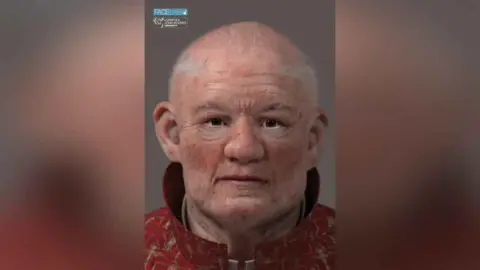 Facelab
FacelabFor centuries the burial place of a 15th Century Abbot who is credited with helping rebuild the church after the terrors of the Black Death was unknown. During excavation work in 2017 a skeleton - now known to have been Abbot John of Wheathampstead - was found. He has now been reburied.
The reburial of Abbot John, next to the Shrine of St Alban, on Saturday was, according to the Dean of St Albans Cathedral "an extraordinary day".
The Very Reverend Jo Kelly-Moore told those gathered for the service how Abbot John's "reach and his legacy were great".
Those who work at the cathedral liken the discovery of his skeleton in an unmarked grave as being "a mystery being solved"
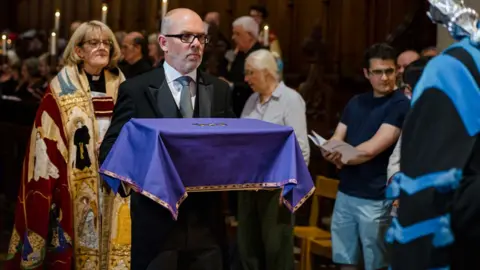 Emma Collins
Emma CollinsBenedictine Abbot John, who was born in Wheathampstead and educated at the Abbey School - now St Albans School - across the road from the cathedral, was called to lead the church twice, from 1420 to 1440 and then from 1451 to his death in 1465.
But his burial site remained undiscovered for centuries until excavation work uncovered his remains, starting a five-year journey before he could be laid to rest again.
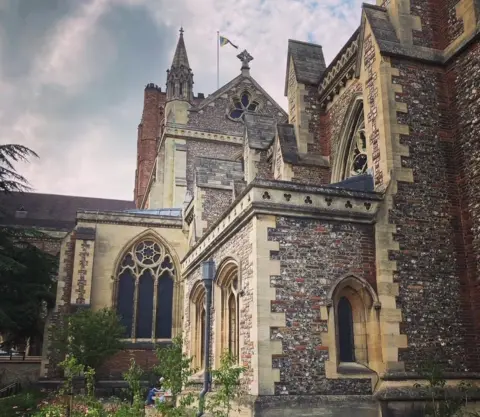 Katy Lewis/BBC
Katy Lewis/BBCStephen De Silva, chairman of the cathedral guides, said the Abbot was an "incredibly important person" in the church's history.
He is credited with "rebuilding and re-establishing its prestige and reconnecting it with political and religious power" after the devastation of the Black Death.
"Abbot John did that in spades - he was a real champion of the Abbey," Mr De Silva said.
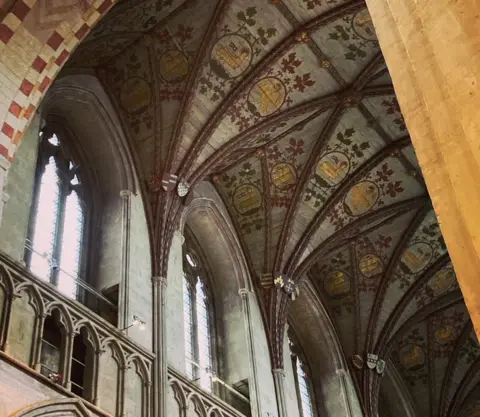 Katy Lewis/BBC
Katy Lewis/BBCHe said John physically restored the Abbey with a programme of building and embellishment and, by building a local, national and international reputation for himself and representing the English clergy at international conferences, gained back its importance.
His schemes included repainting the interior and ceilings, putting in new stained glass and reshaping the western end. He was also influential in introducing internal reforms, promoting the abbey's property interests and securing papal privileges.
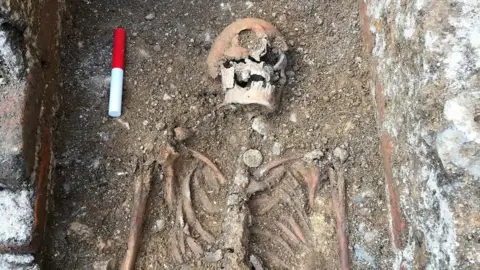 St Albans Cathedral
St Albans CathedralHis skeleton was unearthed along with three papal bulls - a type of public charter issued by a pontiff - that Pope Martin V had given him, confirming the papal privileges he gained in 1423 - and providing the key to his identity.
"He was a real move and shaker in the religious world which was very important at that time," Mr De Silva said, "Abbots were politicians, not just religious figures".
He was also friends with the brother of Henry V - Humphrey, Duke of Gloucester - whose remains his ossuary was placed alongside, in the Chantry Chapel.
"He put St Albans back on the map in a big way," Mr De Silva said.
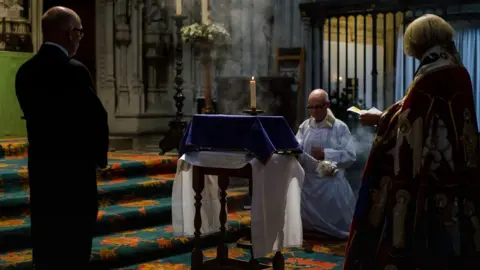 Emma Collins
Emma CollinsThe cathedral guide said he had been "just thrilled" about the remains being found as it was thought he had "been lost to history".
"I have been a guide for about 40 years and there was dispute over where his chapel had been and where his body was - so the discovery was like a mystery being solved," he said.
Mr De Silva said the reburial - 602 years to the day since the Abbey received permission to elect its new Abbot - felt "both reverential and appropriate".
"As a Christian, it's important that he is laid to rest again," he said.
"It was also appropriate to examine his remains in detail, to learn about things like disease and diet, to help us understand more about the life of a high status person of that era.
"But now is the time to recommit him to God."
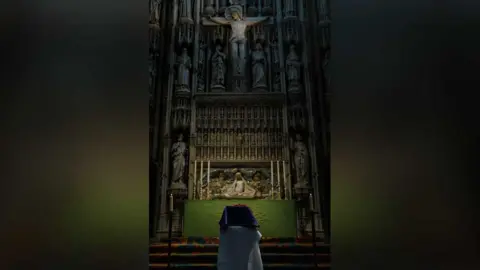 Emma Collins
Emma CollinsIn a sermon at the special Evensong service, the Very Reverend Jo Kelly-Moore, Dean of St Albans, said it was a "privilege" to be part of "undoubtedly an extraordinary day" for both the city's cathedral and for the nation.
She added he was "clearly a man who got things done" and his "reach and his legacy are great".
"It's a moment to reflect on how John's ministry, his legacy, continues in this Abbey in the Benedictine tradition," she said.
"As we brought him through the ancient Abbot's door one last time... perhaps today of all days we are called to remember not just what he did but who he was and what motivated him."
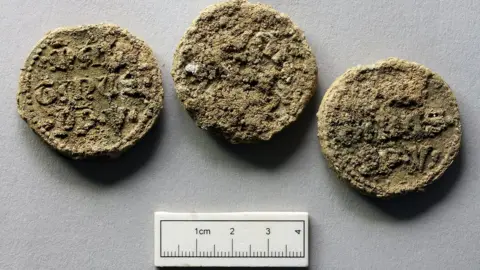 St Albans Cathedral
St Albans Cathedral
Find BBC News: East of England on Facebook, Instagram and Twitter. If you have a story suggestion email [email protected]
